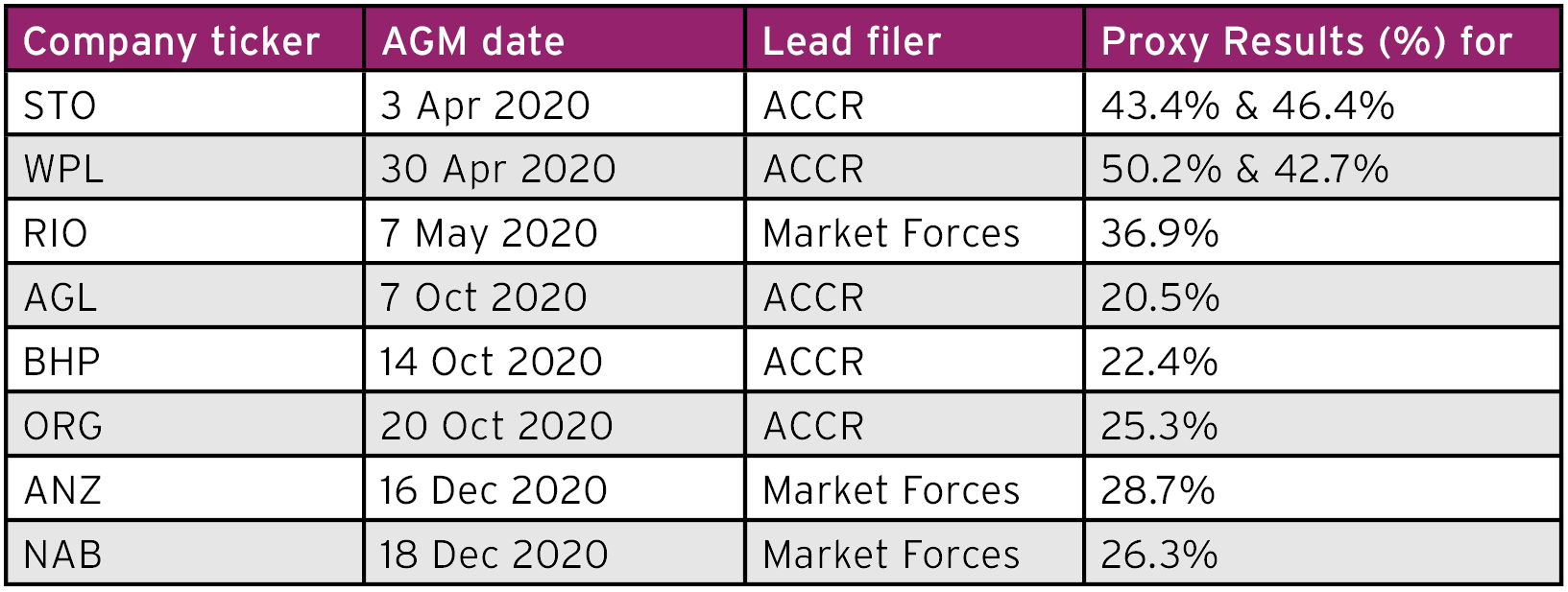Shareholder engagement
Prior to the 2020 AGM season, few ASX300 companies had conducted hybrid meetings, meaning the shift to virtual meetings presented a number of challenges for shareholders, directors and issuers, in large part due to a lack of familiarity with the technology. However, the opportunity presented by the virtual format allowed for wider audiences as seen by increased attendance at meetings in 2020, up 36% compared to 2019[1].
Lessons learnt in the mini-AGM season were passed on from company secretary and investor relations teams to their ASX peers, assisting them to deliver robust virtual meetings during the main season. Shareholder participation in the Q&A portion of meetings varied with best practice demonstrated by the inclusion of live online and phone questions delivered verbatim and answered directly by directors and management. Such practices allayed the concerns of some shareholder advocates that feared investor disenfranchisement. After Treasury’s public consultation where many advocates spoke out against virtual-only meetings being enshrined in legislation, the expectation is hybrid meetings will become the norm.
Corporate misconduct
Directors are being held accountable for proven or alleged misconduct at the issuers they oversee with proxy advisors and investors opposing re-elections. Such failures of organisational governance that allow transgressions also have ramifications beyond re-elections as they raise questions about an issuer’s social licence to operate and can quickly erode shareholder value. In 2020, shareholders have voted to demand that the independent directors they elect act in the best interests of long-term shareholder value, promote the interest of minority shareholders and ensure their governance oversight is robust and resilient.
Corporate culture
Shareholders have shown little appetite for cultural misconduct and heads have rolled prior to AGMs where it was apparent that values of respect and diversity were lacking in corporate culture. Boards will continue to be held accountable for their approach to allegations of wrongdoing and, for the implicated directors, the stigma of a job poorly managed will follow them into their other directorship roles.
Say on Climate
The ‘Say on Climate’ initiative has gained traction in overseas markets but as yet no Australian issuer has voluntarily raised an advisory shareholder vote on climate transition policies. It was the Australasian Centre for Corporate Responsibility (ACCR) and Market Forces adding climate to the agenda at Australian AGMs once again. ACCR’s climate program aimed to accelerate Australia’s transition to a low carbon economy by targeting high emissions companies and demanding action, while Market Forces targeted the big four banks who they perceive to have funding and investment strategies misaligned to the Paris Agreement. These resolutions were contingent on constitutional changes which were not passed, however, with proxy results on shareholder climate-related resolutions gaining upwards of 50% support, Australian issuers must heed the rising tide of shareholder expectation.
Below are some examples of support for climate-related resolutions from 2020. It is notable that support for climate-related resolutions decreased throughout the year.

Large institutional investors continue to closely engage with carbon-intensive companies on climate-related matters, rather than applying a blanket stewardship approach. Vanguard did not support shareholder proposals at Rio Tinto, Santos Limited and Woodside Petroleum, allowing the energy industry “more time to mature” before setting Scope 3 emission targets. Blackrock decided not to support the climate-related shareholder proposals following engagement with management but has indicated the intent to vote against director re-election in 2021 where adequate climate and sustainability-risks are not adequately demonstrated and integrated into company strategy.
This is in contrast to the proxy advisors whom recommended ‘for’ a number of climate-related shareholder proposals. CGI Glass Lewis has also announced a climate policy overlay for 2021 which will generally support all climate-related and lobbying resolutions. Recommendations for other shareholder proposals will be guided by the materiality as indicated by the Sustainability Accounting Standards Board (SASB).
Pay and performance
Alignment of pay and performance for executives was put into sharp focus with a third of S&P/ASX 100 stocks cutting dividends and directly impacting shareholder value during the height of the COVID-19 pandemic[2]. Alongside employee pay cuts, company restructures and dilutive equity raisings, excessive remuneration to executives was viewed poorly by shareholders and proxy advisors alike.
It was, of course, a tale of two economies and shareholders were happy to support remuneration packages that adequately reflected company performance and held executives accountable to long-term shareholder value creation.
The use and disclosure of non-financial performance criteria in remuneration structures remains contentious. Following significant industry consultation, the Australian Prudential Regulation Authority (APRA) backed away from requiring APRA-regulated entities to have a 50% cap on financial measures for variable remuneration. It now seeks to require that a “material weight” be assigned to non-financial measures in order to embed governance, culture and risk into remuneration incentive frameworks.
This pursuit is noble, but it should be acknowledged that non-financial metrics can be opaque and obscure a shareholder’s ability to clearly assess executive outperformance. Strong disclosures, transparent targets (threshold, target and maximum) and demonstration that the variable remuneration is truly at-risk will be required to satisfy proxy advisors and shareholders.
The 2021 landscape
The impact of the global pandemic will continue to be felt into 2021. The sentiment among governance professionals is that it would be folly to return to business-as-usual. Issuers need to bring the lessons learnt in 2020 into their future strategies, including staff well-being and flexibility, support for local communities, supply chain resilience, diversity as strength, equitable and ethical practices and finally a continued momentum towards a low carbon-emission economy.
[1] Computershare ‘Virtual AGM Report’ Insights from online meetings in April & May 2020
[2] Jackie Edwards, ‘Australian Investors Set for Biggest Payout Cuts in a Decade’, 15 July 2020, Bloomberg https://www.bloomberg.com/news/articles/2020-07-14/australian-investors-brace-for-biggest-dividend-cuts-in-a-decade

Corporate Governance Manager, Georgeson Australia
Allyson Porter
In the role of Corporate Governance Manager, Allyson leverages her investor relations experience and proven communication skills to provide a broad range of governance advisory services to Georgeson clients. Allyson understands the increasing complexity of environment, social and governance (ESG) obligations and helps our clients to develop proactive shareholder engagement programs to address the ever-evolving ESG landscape. Allyson holds a Diploma of Investor Relations from Australasian Investor Relations Association, a Bachelor of Commerce from Australian National University and a Master of Science (Aviation Management) from University of New South Wales.
Visit our AGM resource hub
For more information about AGMs or to get in touch with Computershare, visit our meetings resource hub